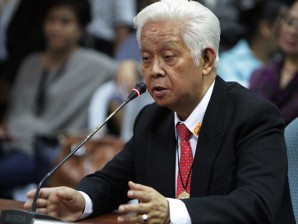A group of former prisoners led by ex-convict Romeo Jalosjos Jr. and an organization formerly represented by fugitive retired Maj. Gen. Jovito Palparan were among the 15 party-list groups that the Commission on Elections (Comelec) on Wednesday disqualified from next year’s balloting.
The Comelec decision brought to 50 the number of groups it had so far dropped from the list of organizations qualified to take part in the midterm elections in May.
At a press conference, Comelec Chairman Sixto Brillantes Jr. announced that the poll body had canceled the accreditation of Kapatiran ng mga Nakulong na Walang Sala (Kakusa) and Bantay.
Kakusa, which identifies Jalosjos, a former Zamboanga del Norte representative convicted of raping a minor, as its president and chair emeritus, is supposed to represent the innocent who continue to languish in jails and those who have already served their sentences.
Garnering 234,788 votes in the 2010 elections, Kakusa earned a seat in the House of Representatives currently occupied by Ranulfo Canonigo.
Bantay, known to advocate anticommunism causes, was represented in the 14th Congress by Palparan after it got 169,869 votes in the 2007 elections. It failed to win a seat in 2010.
Palparan, called a “butcher” by human rights groups that have accused him of being behind the summary executions of activists in areas where he had been assigned, carries a P2-million bounty on his head. He is facing charges of kidnapping in connection with the disappearance of students Sherlyn Cadapan and Karen Empeño in 2006.
Last year, Palparan declared that Bantay was preparing a comeback in 2013, with him as one of the group’s nominees. That won’t happen because the Comelec en banc unanimously decided to cancel the group’s accreditation.
Pacyaw, Araro
Others dropped from the roster of groups that can participate in the May elections were Agri, Aksyon Magsasaka Partido Tinig ng Masa (Akma-PTM), Ako Agila, Pilipino Association for Country/Urban Poor Youth Advancement and Welfare (Pacyaw), Ako Bahay, PM Masda, Coconut Farmers Association (Cofa), Alliance for Rural and Agrarian Reconstruction Inc. (Araro), Katutubo and Opo party-list or Pamilyang Overseas Filipino Workers-Small and Medium Entrepreneurs Network Foundation Inc.
The groups claimed to represent peasants, coconut farmers, urban poor, transport organizations and those advocating youth and sports development. They were allowed to join the 2010 elections but failed to win a seat in Congress.
RAM Guardians
Brillantes said the Comelec en banc also unanimously affirmed decisions made in the body’s division level to deny the application for accreditation of three new groups.
He identified them as RAM Guardians, Alyansa Para Sa Demokrasya, and Association of Airline and Airport Workers.
“Their applications were denied by the divisions and the commission en banc affirmed the denial,” Brillantes said.
First timers
The three groups were part of the 165 organizations hoping to participate for the first time in the congressional race next year.
A total of 289 groups have filed applications for accreditation for next year’s party-list elections.
So far, the Comelec delisted 28 existing party-list organizations, of which five, including Ako Bicol, 1st Consumer Alliance for Rural Energy (1-Care) and Association of Philippine Electric Cooperatives (Apec), have incumbent representatives in Congress.
Millionaires
The disqualification of Ako Bicol, 1-Care, Apec and other groups came following the Comelec announcement to crack down on bogus groups to cleanse the party-list system. Critics claimed that millionaires and scions of influential political families were using the party-list system to gain seats in Congress.
“We are not going to give reasons anymore [as to why they were disqualified] because the reasons are contained in the decision which is already promulgated and available at the commission secretariat,” Brillantes told reporters yesterday.
But no copy of the decision was made available to the media on Wednesday.
In general, Brillantes said Kakusa and the 11 other existing groups were dropped from the rolls of accredited party-list organizations because they failed to pass the test using the guidelines enumerated in the Ang Bagong Bayani v. Comelec case in 2003.
In that decision written by then Chief Justice Artemio Panganiban, the Supreme Court issued guidelines to ensure that only those who belong to marginalized and underrepresented sectors—labor, peasant, fisherfolk, urban poor, indigenous cultural communities, elderly, handicapped, women, youth, veterans, overseas workers and professionals—can run for party-list seats in Congress.
The guidelines said the political party or sector must represent the marginalized and underrepresented groups identified in the Constitution and that the party or organization must not be “an adjunct of” or a “project organized or an entity funded or assisted by the government.”
It also said that the nominee of a party must represent the marginalized and underrepresented sectors.
“The common denominator is the Ang Bagong Bayani ruling which we are adopting and what we are applying,” Brillantes said.
“We believe that our decision will be correct because we are adopting the pronouncement of the Supreme Court,” he added.
Without accreditation, the groups cannot vie for seats reserved for party-list groups in the House of Representatives.
Under the Constitution, 20 percent of seats in the Constitution are reserved for party-list groups. Currently, 44 party-list groups have 58 representatives in the 287-member House.
Among the perks of a House member is a yearly allocation of P70 million in Priority Development Assistance Fund, a pork barrel, for the lawmaker’s pet projects.


